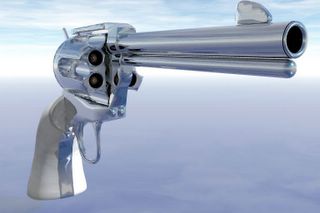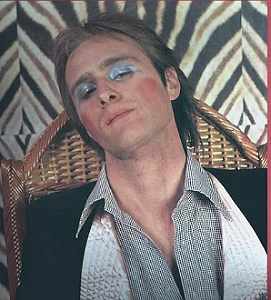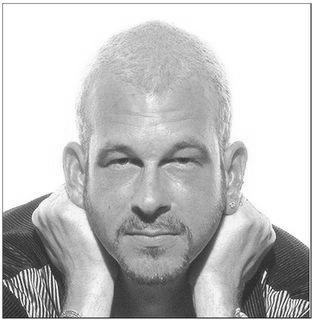
A minor preamble in two parts follows:
1. In my band fiction we permitted each other creative "gimmes", wherein a member who felt very strongly about a point of arrangement or production got their way. These were granted infrequently and based upon the degree of passion of the involved party.
In an earlier incarnation of the band I could slip the guitarist a 20 if we couldn't agree on something. That's funny, huh?
So anyway, I'm taking a Taste Mulligan here. My second point:
2. We all have things we dig that we're loath to admit. Few things make this bombthrower happier than a new, well pressed suit (in a tropical wool a fitted suit will hang with a fecund elegance that could well be the meaning of life). Madonna? Madonna has written some of the most Beatlesque songs of the last 22 years. Also, I love little dogs. In my family Beethoven was the Great Unmentionable. Fucking love the guy. Especially his live stuff. STP is awesome.
So, I love "The Soul Cages" by Sting. There, I said it.
But really, this is one fine-ass record and if there's one thing I've labored to clarify about myself is that I hate talentless shite.
One of the things about "The Soul Cages" that makes it the Good Sting Album is that it is of a piece. No one has done more to take rock back to the pre-Beatles, pre-album ethos of 1960 where LP's where an excuse to resell singles. The Police were the ultimate Singles band; I refer endlessly to the 1/3 transcendentally awesome 2/3 bad formula that they maintained. Nowhere was this truer than on their albums, the whole synchronicity-causality thing of '83 notwithstanding. The sonic imprint of each record was what gave it a unique character rather than any thematic thread.
"The Soul Cages" is almost exclusively an exploration of a father-son relationship. Thrown into this are a hundred examinations of the father mythology, of the son-surpassing-the-father archetypal story, Oedipal stuff, competition, and ultimately several detailed studies on the death of ones' father. Stingie had lost his father and mother to cancer in the late '80s (prostate, breast) so the thematic singularity is understandable. They were in their early and mid- 50's.
These guys, y'know, with the death and tragedy that surrounds them? Lennon with his mother getting offed by a car in '57? Ouch. Breast cancer got Mary McCartney, too, when Paul was a pretty young kid. At least Schwing was a grown man of 39 when he printed this understated monster of a record.
This album introduces the lineup that he would used for the next ten years; Manu Katche on the kit (soon to be replaced by Vinnie Coliauta), the superlative David Sancious on keyboards and Mr. Andy Summers Junior Dominic Miller on guitar. I hear some unfortunate soprano sax in a couple of passages that is probably whatsisname Marsalis, a hangover of Sting's earlier wanking period with his "ethnic shit" (my drummer Dave Barrett's term).
Also hauntingly deployed are Northumbrian and Ulean pipes, which brings me to my next point.
We all know that XTC are the prime progenitors of that sort of mythical maritimish Britishness that they invented brilliantly in 1980. The richness of XTC's gestalt on "Black Sea" and "English Settlement" is a thing to behold; the constant deployment of the oceanfaring metaphor is brilliant, evocative and career-defining.
Now, Sting does this as effectively on "Cages". "Cages". Ha ha.
The foggy, dark, hellish nightscapes of his native Newcastle are the canvas upon which he paints a world of tragic British-Isles-ness that is the Bronze Age equivalent of XTC's Hail-Fellow-Well-Met Elizabethan trip. Ship-building, once Newcastle's greatest export next to coal is always going on in the background as well, all welding torches and hellish giant burning cauldrons. Evocations of heathen, druidic and pre-Roman times are subtle and startling, as are the constant barbs and jokes at the expense of the good old Church of England. Two priests are described "fussing and flapping in priestly black like a murder of crows". Nice language, that. In "Jeremiah Blues (Part 1)" the pope "claimed that he'd been wrong in the past/This was a big surprise...". Later Spling tells us to "take your father's cross/Gently from the wall/A shadow still remaining/See the churches fall/In mighty arcs of sound..."
"Island Of Souls" opens the record with the story of a mortally wounded ship riveter and the hopelessness that haunts his son. Lonely pipes set the stage, followed by a repetitive minor string figure that evokes a misty street that ends in the monstrous hull of a new ship in a drydock. The beauty of the song lies in the hypnotic, simple strophes of the melody which is a welcome return to Police form. Also remarkable and Policeish is the meter, a stately 4/4 that disguises and fights and makes up with a 12/8 undertone that perolates steadily down in the skeleton of the song.
The despair in "Island of Souls" is Dickensian in both depth and Englishness. The child's dreams of escaping with his father and the "brass watch and check" the father receives in the wake of his mortal accident are classic elements of a tragic fairytale, and the ever-lurking ultimate triumph of the boy (Spling) is the only relief, a sort of Deus Ex Machina that lends import to the tragedy.
"The Wild Wild Sea" is the heart of "Soul Cages", a rich, gorgeous, atmospheric tone poem that follows the narrator through a dream into the sea, into a dead calm where "the sky was the color of clay". A huge storm gathers, and with it a ghostly figure appears in the wheelhouse of our hero's ship: "For the ship had turned into the wind/Against the storm to brace/And underneath the sailor's hat/I saw my father's face..."
The specter guides the craft to safety through the storm, and we are left breathless by the drama and the deftness of the story's telling. Archetypal, haunting and cinematic, "The Wild Wild Sea" is a masterpiece of creative music making.
"The Soul Cages" is as much journey as it is record; lifting the needle prematurely disorients and breaks a narrative longer than the songs themselves. A man is exorcising his doubts and regrets in the wake of his father's death and it forces us to confront that which is unresolved in our own worlds.
Much is the pity that Skling never returned to this form; the unified album. It is one of the few times his intellect serves him well instead of poorly; his mastery of the long-form song cycle is a revelation. The consistency of tone recalls The Police canon in a way that is much more compelling than the busy, contrived, kitchen-sinky, pseudo-world music of his other solo albums. Cha-ching has always been able to toe an ultracommercial line while remaining outwardly without creative reproach. It's weird how he does it. "The Soul Cages" was the first time in his then 12-year-old career where he brooded instead of acting like he was brooding. It is a very, very good record indeed, and probably his only one to sell less than 45 bajillion copies. I would encourage anyone to give this record a thorough going-over. Especially if your father is getting on.
Probably don't want to go telling everyone about it though, huh.
Tell 'em you've been listening to Fitty-Cen'.
Yeah, the new Fitty-Cen' concept album about coming to terms with sucking and being talentless and stupid and ignorant and stupid.























